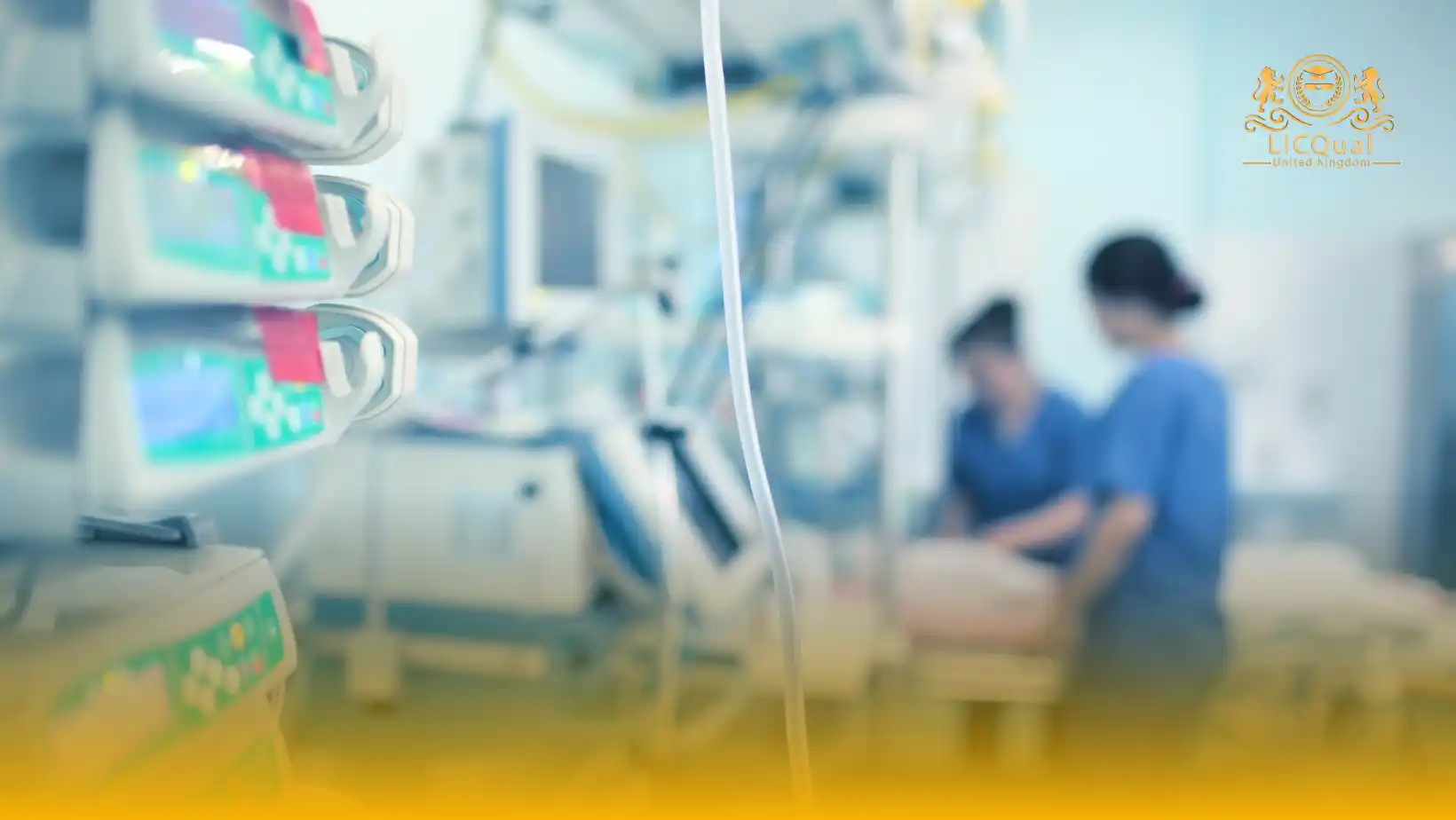The LICQual Level 3 Award in Digital Technology in Nursing is a specialized qualification tailored for experienced nursing professionals who wish to master advanced digital competencies in healthcare.
This course builds upon prior knowledge to offer in-depth understanding and application of digital technologies within clinical settings. It focuses on equipping learners with strategic insights and hands-on skills that align with global digital healthcare standards, enabling nurses to lead and support innovation in patient care delivery.
This advanced-level course addresses critical areas such as electronic medical records optimization, digital leadership in healthcare, advanced telehealth practices, AI-assisted diagnostics, and clinical data analytics. The LICQual Level 3 Award in Digital Technology in Nursing enables learners to analyze and implement complex digital systems while maintaining ethical standards and patient safety.
The curriculum ensures that participants not only operate existing systems effectively but also contribute to shaping the future of healthcare through technology.
Designed for qualified nurses, nurse educators, and digital health champions, this qualification provides both theoretical knowledge and practical case studies that reflect real-world digital transformations in healthcare.
The course supports decision-making using digital data, enhances virtual patient management skills, and promotes the integration of technology into care plans. Participants are trained to assess the impact of digital solutions on patient outcomes and organizational performance.
By completing the LICQual Level 3 Award in Digital Technology in Nursing, learners will be prepared to take leadership roles in digital health projects, contribute to policy development, and facilitate the training of peers in digital tools and best practices.
The course promotes critical thinking, strategic use of digital resources, and collaborative problem-solving in technologically advanced healthcare environments. It also supports compliance with data governance frameworks and international digital health regulations.
In an era where healthcare is increasingly driven by data and innovation, the LICQual Level 3 Award in Digital Technology in Nursing provides a future-focused pathway for nurses to remain competitive, capable, and influential. This qualification not only enhances professional value but also ensures the delivery of safe, efficient, and tech-enabled patient care. By empowering nurses to lead in digital adoption, the course contributes to the sustainable evolution of global healthcare systems.
Course Overview
Qualification Title
LICQual Level 3 Award in Digital Technology in Nursing
Total Units
6
Total Credits
6
GLH
18
Qualification #
LICQ2200514
Qualification Specification
To enroll in the LICQual Level 3 Award in Digital Technology in Nursing applicants must meet the following criteria:
|
Qualification# |
Unit Title |
Credits |
GLH |
|---|---|---|---|
|
LICQ2200514-1 |
Advanced Use of Digital Devices in Clinical Settings |
1 |
3 |
|
LICQ2200514-2 |
Clinical Decision Support Systems (CDSS) |
1 |
3 |
|
LICQ2200514-3 |
Integration of AI in Patient Care Processes |
1 |
3 |
|
LICQ2200514-4 |
Remote Patient Monitoring and IoT in Nursing |
1 |
3 |
|
LICQ2200514-5 |
Compliance and Cybersecurity in Healthcare IT |
1 |
3 |
|
LICQ2200514-6 |
Evaluating Digital Health Technologies for Practice |
1 |
3 |
By the end of this course,applicants will be able to:
1. Advanced Use of Digital Devices in Clinical Settings
- Operate advanced digital tools, devices, and software commonly used in modern healthcare environments.
- Apply device-specific protocols to enhance patient safety, clinical workflow, and treatment accuracy.
- Troubleshoot, maintain, and calibrate digital equipment to ensure consistent performance.
- Demonstrate competency in integrating multiple digital devices within nursing practice.
- Adapt digital devices effectively for different patient needs and clinical scenarios.
- Evaluate the impact of device usage on nursing efficiency and patient care quality.
2. Clinical Decision Support Systems (CDSS)
- Understand the structure, functions, and types of Clinical Decision Support Systems in healthcare.
- Utilize CDSS tools to enhance clinical judgment, care planning, and patient management.
- Analyze the influence of CDSS on nursing workflows, patient outcomes, and decision-making.
- Integrate CDSS insights into daily clinical practice for improved safety and efficiency.
- Evaluate the advantages and limitations of CDSS technologies in nursing care.
- Apply critical thinking to interpret data and recommendations generated by CDSS systems.
3. Integration of AI in Patient Care Processes
- Explain the applications of artificial intelligence in patient assessment, diagnostics, and treatment planning.
- Apply AI-driven tools ethically and effectively within nursing roles and clinical decision-making.
- Evaluate AI-based outcomes in improving accuracy, efficiency, and patient satisfaction.
- Demonstrate the ability to integrate AI insights into nursing workflows and care plans.
- Identify potential risks and limitations associated with AI use in clinical practice.
- Analyze case studies to assess the impact of AI on healthcare delivery and patient outcomes.
4. Remote Patient Monitoring and IoT in Nursing
- Implement remote patient monitoring systems and Internet of Things (IoT) technologies effectively.
- Interpret data generated from connected devices for informed clinical decision-making.
- Support patient adherence, safety, and engagement through IoT-enabled tools.
- Assess the reliability and accuracy of remote monitoring data in nursing practice.
- Integrate remote care technologies into standard nursing workflows and telehealth services.
- Evaluate the effectiveness of IoT solutions in improving patient outcomes and care efficiency.
5. Compliance and Cybersecurity in Healthcare IT
- Demonstrate knowledge of healthcare data regulations, compliance standards, and legal requirements.
- Identify and mitigate cybersecurity risks in clinical and organizational IT systems.
- Apply secure practices for handling sensitive digital health information.
- Evaluate protocols to ensure compliance with data protection laws in nursing practice.
- Develop strategies for safeguarding patient data against breaches and unauthorized access.
- Implement best practices for ethical and secure management of digital healthcare tools.
6. Evaluating Digital Health Technologies for Practice
- Critically assess the effectiveness of digital tools, software, and platforms in nursing practice.
- Conduct evaluations based on usability, clinical outcomes, cost-effectiveness, and integration potential.
- Make informed decisions regarding adoption or recommendation of digital health solutions.
- Analyze the impact of digital technologies on patient care, workflow efficiency, and staff competency.
- Apply evidence-based criteria to select appropriate tools for clinical settings.
- Develop strategies to optimize digital technology implementation in healthcare organizations.
The LICQual Level 3 Award in Digital Technology in Nursing is designed for nursing professionals and healthcare practitioners who want to develop advanced digital competencies to enhance patient care, clinical efficiency, and professional practice.
1. Registered Nurses
- Gain advanced skills in managing electronic health records (EHRs) and digital patient information.
- Learn to integrate telehealth systems effectively into daily nursing practice.
- Enhance clinical decision-making using data-driven insights.
2. Healthcare Assistants and Practitioners
- Develop practical knowledge of digital tools to support nursing teams.
- Improve workflow efficiency and reduce administrative burdens.
- Learn to utilize patient monitoring technologies to ensure safety.
3. Nursing Leaders and Supervisors
- Implement and manage digital technology initiatives in healthcare settings.
- Guide teams on the responsible use of healthcare IT systems.
- Support organizational strategies for digital transformation in nursing.
4. Clinical Educators and Trainers
- Integrate digital learning tools into nursing education programs.
- Train staff on AI-enabled systems and modern healthcare technology.
- Foster innovation in digital nursing teaching methods.
5. Aspiring Nursing Professionals
- Build a strong foundation in digital healthcare technology.
- Prepare for modern clinical practice using advanced digital tools.
- Gain confidence in technology-driven patient care environments.
6. Healthcare Innovation Enthusiasts
- Explore emerging digital solutions in nursing and healthcare.
- Contribute to improving patient outcomes using technology.
- Stay updated with latest trends in healthcare IT.
7. Professionals Seeking Career Advancement
- Enhance your professional profile with advanced with LICQual Level 3 Award in Digital Technology in Nursing.
- Open opportunities in healthcare leadership and digital transformation roles.
- Gain credibility as a technology-savvy nursing professional.
8. Those Focused on Patient-Centered Care
- Use digital tools to personalize patient care and improve outcomes.
- Streamline communication between patients and healthcare teams.
- Ensure accuracy and safety in clinical processes through technology.
Assessment and Verification
All units within this qualification are subject to internal assessment by the approved centre and external verification by LICQual. The qualification follows a criterion-referenced assessment approach, ensuring that learners meet all specified learning outcomes.
To achieve a ‘Pass’ in any unit, learners must provide valid, sufficient, and authentic evidence demonstrating their attainment of all learning outcomes and compliance with the prescribed assessment criteria. The Assessor is responsible for evaluating the evidence and determining whether the learner has successfully met the required standards.
Assessors must maintain a clear and comprehensive audit trail, documenting the basis for their assessment decisions to ensure transparency, consistency, and compliance with quality assurance requirements.







